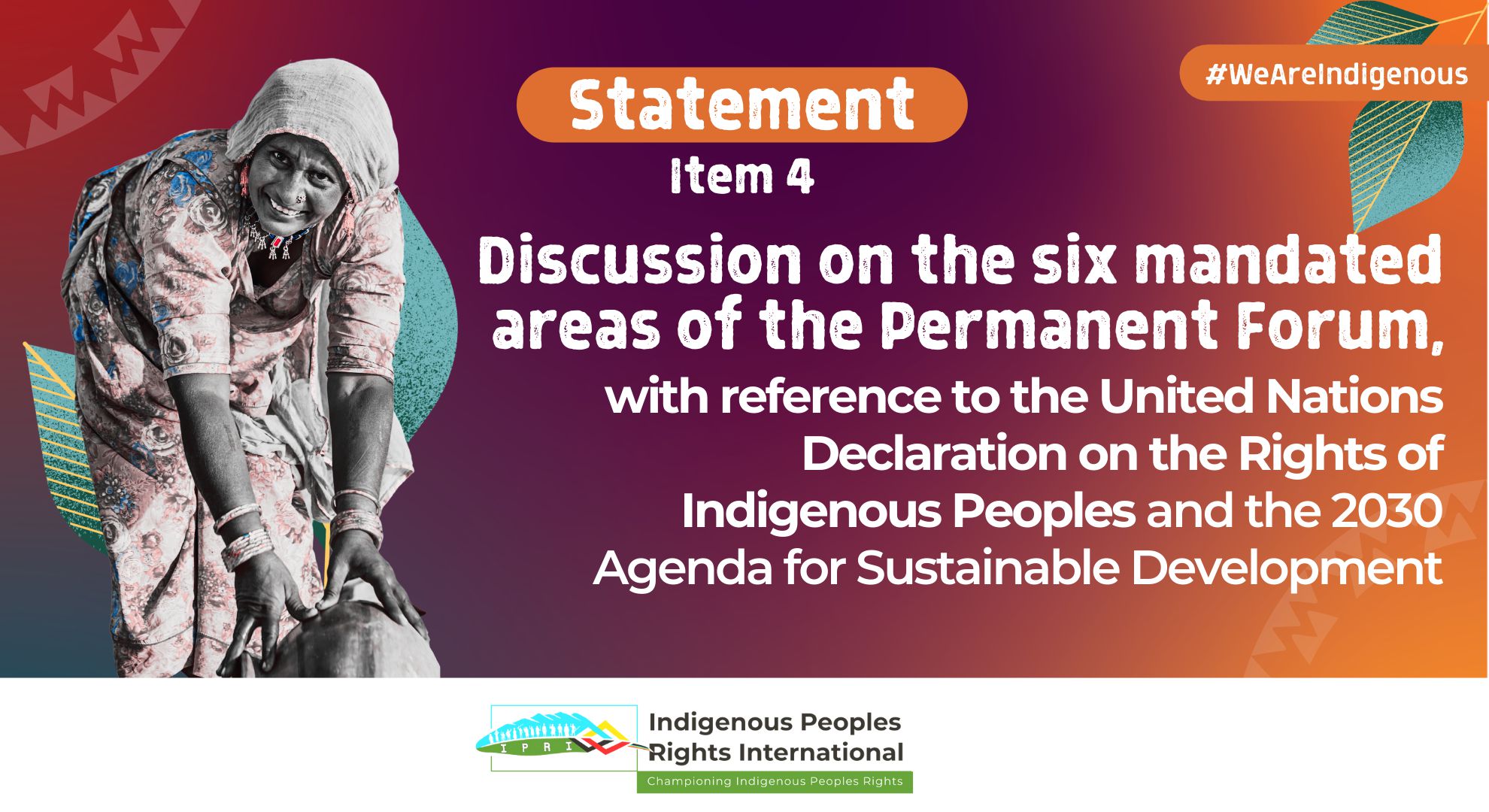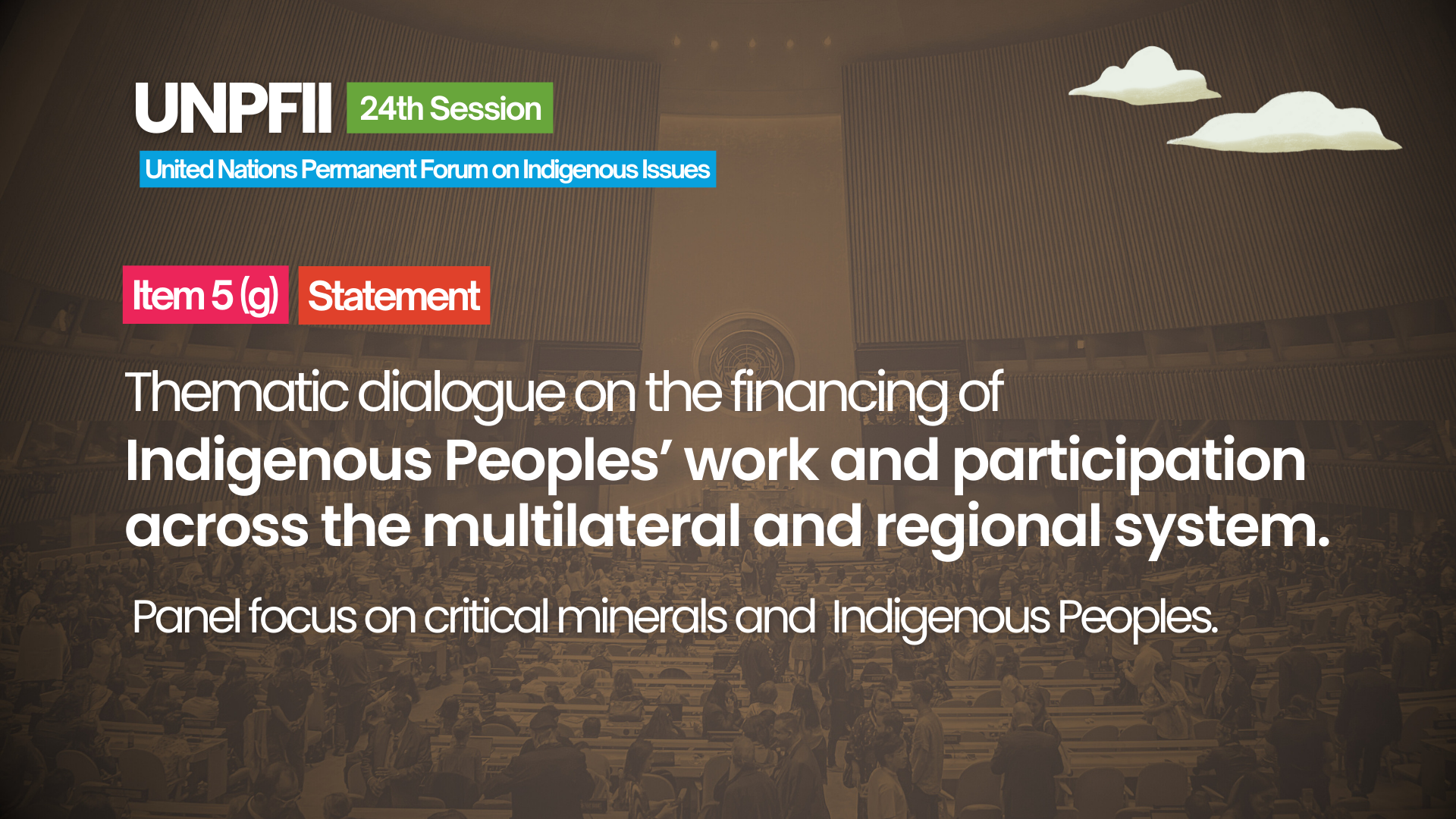Statement by Indigenous Peoples Rights International (IPRI)
Indigenous Peoples Rights International (IPRI) is a global Indigenous-led initiative to confront violence and criminalization of Indigenous peoples and the resulting impunity. We would like to address several issues in our statement in relation to the mandated areas, UNDRIP and Goal 16 of the UN SDG aiming to promote peaceful and inclusive societies for sustainable development, provide access to justice for all and build effective, accountable and inclusive institutions at all levels.
In order to advance in the implementation of Goal 16, protection of Indigenous human rights defenders is essential. Human rights institutions, civil society organizations and UN special procedures have called the attention of the international community on the increasing violence and criminalization suffered by Indigenous human rights defenders when they try to implement their rights, confronting threats to their lands and cultures arising from development projects, conservation, climate change mitigation and adaptation and other causes.
IPRI has also worked on research and data gathering regarding violence and criminalization against Indigenous peoples. In recent data collected from communities between 2021-2022, a total of 540 reported cases of individual human rights violations were reported from 6 country partners. Individual cases include, but are not limited to, the following: arrests, killings, abduction, enforced disappearance, physical assault, sexual assaults, international humanitarian law violations, coercion, illegal arrests, threat, and harassment. It is imperative to confront this situation.
In the consideration of how to move forward with the implementation of UNDRIP, we would like to mention the work the UN Treaty Bodies and Special Procedures of the Human Rights Council have been developing. IPRI has published a compilation of such work for the period 2020-2022. It shows that the Treaty Bodies consider UNDRIP as an authoritative instrument on the interpretation and implementation of the main binding human rights treaties and conventions when applied to Indigenous peoples. They have underlined the importance of ensuring Indigenous peoples’ collective rights to self-determination and lands, territories and resources, and have made observations and recommendations in this regard. Follow up on implementation of these observations and recommendations as related to UNDRIP and the SDGs should be strengthened, including by raising awareness and promotion within the UN system and the ECOSOC. We hope the UNPFII can consider working in this regard. We draw the Forum’s attention to IPRI’s most recent publication – a compilation of Indigenous People’s Rights Legislation and Jurisprudence.
IPRI continues to regularly monitor and report on developments in regional and national courts regarding the rights of Indigenous peoples. An increasing number of court decisions refer to UNDRIP and affirm the need to respect Indigenous peoples’ fundamental human rights, and thereby facilitating access to justice for Indigenous peoples when their fundamental human rights have been violated. Access to justice is a key element in ending impunity when human rights violations of Indigenous peoples occur. However, justice continues to be elusive for Indigenous peoples and obstacles to access justice, including lack of compliance with court decisions, remain. To advance in the achievement of Goal 16 and the implementation of UNDRIP, it is necessary that favorable court decisions are fully implemented.
Further, a critical aspect of access to justice in the case of Indigenous peoples is the respect for Indigenous peoples’ own justice systems. Treaty bodies and special procedures have insisted on the need for adequate coordination of ordinary and Indigenous jurisdictions. IPRI would like to recommend the Permanent Forum to pay particular attention to all these different sides of access to justice for Indigenous peoples, including through specific discussions and interactive dialogues with all relevant actors. This is a critical element in the realization of indigenous peoples rights and sustainable development for all.
We would like to make the following recommendations to the Permanent Forum:
- To call on States to provide protection for indigenous People’s human rights and environmental rights defenders
- For States to report on the condition of indigenous peoples under Goal 16 of the SDGS under the key indicator on human rights
- To call on states to implement the decisions and recommendations of treaty bodies and special procedures upholding the rights of indigenous peoples in line with the UNDRIP to advance justice, human rights protection, and sustainable development for indigenous peoples
- To call on states to fully recognize and respect indigenous Peoples’ justice systems as critical to advancing access to justice by indigenous peoples.
Thank you for your attention.





